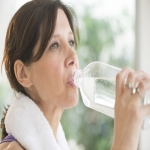What is dehydration and how does it correlate to an increased risk of orthopedic injuries?

Dehydration is defined as a harmful reduction in the amount of water in the body. This happens when you do not drink enough water and electrolytes. In most cases, dehydration is worsened with physical activity.
When fully hydrated, the human body is made up of about 50-65 percent water. The remainder of the body is made up of muscle, bones, organs and fat. Losing even 1 percent of your bodies water can put you at an increased risk for injury and illness. In this blog, we will be looking at dehydration in particular to its risk of increased orthopedic injury.
Why is Water so Important?

Being properly hydrated improves circulation, regulates body temperature, supplies nutrients and oxygen to your cells, aids in weight management, and much more. For that reason, dehydration can increase your risk of orthopedic injuries in multiple ways.
Firstly, oftentimes when you are dehydrated your energy is reduced, which can lead to a sudden decline in strength, coordination, and ability to make decisions. As a result, this can leads to an inability to properly react to external stimulus, such as physical activity.
Second, when you have a decline in strength and coordination, your body is unable properly react to normal injury prevention muscle activation. An example of this is stepping on an uneven surface and being able to prevent spraining your ankle or knee.
A third way that dehydration can predispose you to injury is by increasing your risk of muscle cramps. This typically occur when your body is low on water and electrolytes, causing an abnormal muscle contractions otherwise known as cramps.
Cartilage Health and Dehydration

Cartilage is made up of mainly water and collagen. When dehydrated, the cartilage is deprived of the water it needs to maintain its cushion.
As a result, you could potentially suffer from an injury to cartilage. For example, if you sustain a tear of the meniscus of you knee, you might require a surgery to repair it.

Water is Power!
Some tips to try and stay properly hydrated include:
- Drink about eight 8 ounce glasses of water a day.
- Keeping water with you all day.
- Drink water before, during, and after exercise.
- Drink some water, even when you are not thirsty.
References
Cleary MA, Sitler MR, Kendrick ZV. Dehydration and symptoms of delayed-onset muscle soreness in normothermic men. J Athl Train. 2006;41(1):36–45.
Williams, R. (2019, December). Hydration and injury precention – The Important Role Hydration Plays. Retrieved April 16, 2020, from https://www.coastalorthoteam.com/blog/hydration-why-water-matters-for-preventing-injuries-0


